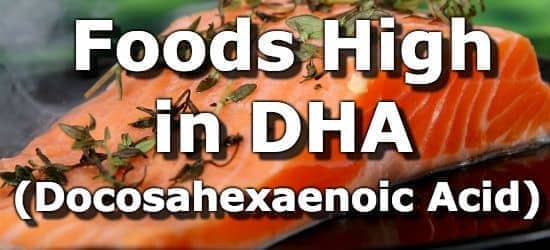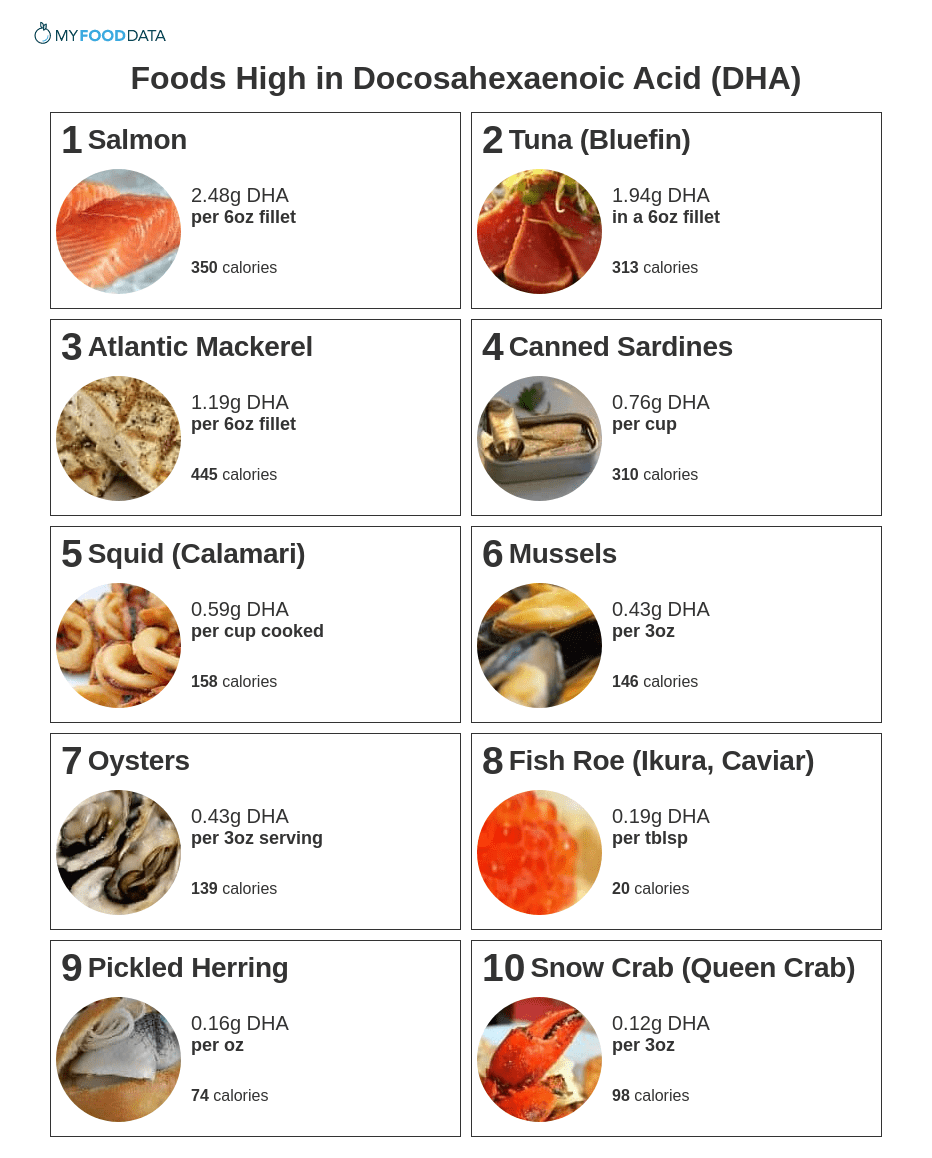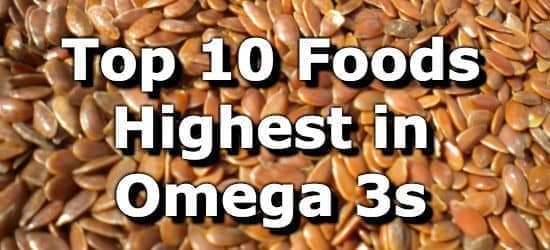Foods High in Docosahexaenoic Acid (DHA)

Docosahexaenoic acid (DHA) is a type of long-chain omega-3 fatty acid required for the healthy development of the brain and retina (eyesight). (1,2) Further, some studies show cognitive benefits from DHA in older adults, improving memory and learning. (3)
DHA is found primarily in fish and seafood. It can also be created by the body using alpha-linolenic acid (ALA) (4), however, only 3% - 6% of ALAs get converted into DHAs. (5) Since DHA is important for brain development, it is present in breast milk. (6) Pregnant and lactating women should aim to consume 0.2 - 0.3g of DHA per day. (7)
Foods high in DHA include salmon, tuna, canned tuna, mackerel, white fish, canned sardines, squid (calamari), mussels, oysters, cod, fish eggs (roe), pickled herring, and snow crab. Pregnant women should avoid mackerel, swordfish, and tilefish due to their potential mercury content. All other sources should be considered safe and healthy as long as they are fresh and well-prepared.
Below is a list of foods high in DHA ranked by a common serving size. For more, see the extended list of foods rich in DHA.
List of Foods Highest in DHA
-
3g Omega 3 per 1g Omega 6
 1. Salmon + Add
1. Salmon + Add
DHA
per 6oz FilletDHA
per 100gDHA
per 200 Calories2.48g 1.46g 1.41g - 2.48g DHA in 1 tbsp of salmon oil
- 0.637g DHA per 3oz of canned salmon
- 0.076g DHA in 1oz of smoked salmon
-
24g Omega 3 per 1g Omega 6
 2. Tuna (Bluefin) + Add
2. Tuna (Bluefin) + Add
DHA
in a 6oz FilletDHA
per 100gDHA
per 200 Calories1.94g 1.14g 1.24g - 0.54g DHA per 3oz of canned tuna
- 0.4g DHA in 6oz of skipjack tuna
- 0.18g DHA in 6oz of yellowfin tuna
-
9g Omega 3 per 1g Omega 6
 3. Atlantic Mackerel + Add
3. Atlantic Mackerel + Add
DHA
per 6oz FilletDHA
per 100gDHA
per 200 Calories1.19g 0.7g 0.53g More whitefish high in DHA
- 1.58g per 5oz Atlantic herring fillet
- 1.38g per 6oz swordfish fillet
- 1.27g per 5oz Pacific herring fillet
- 1.13g per 6oz (170g) shark fillet
- 1.08g in 3.5oz (100g) of steelhead trout
- 0.93g per 4.5oz striped bass fillet
- 0.74g per 4.5oz rainbow trout fillet
- 0.62g per 4oz sea bass fillet
- 0.56g per 4oz pompano fillet
- 0.38g per 3oz pollock fillet
- 0.36g per 4.5 oz walleye pike fillet
- 0.28g per 6oz Atlantic cod fillet
- 0.26g in 1oz of smoked trout
-
1g Omega 3 per 4g Omega 6
 4. Canned Sardines + Add
4. Canned Sardines + Add
DHA
per CupDHA
per 100gDHA
per 200 Calories0.76g 0.51g 0.49g - 0.62g DHA per oz of dried sardines
-
201g Omega 3 per 1g Omega 6
 5. Squid (Calamari) + Add
5. Squid (Calamari) + Add
DHA
per Cup CookedDHA
per 100gDHA
per 200 Calories0.59g 0.42g 0.74g - 0.32g DHA per 3oz of fried calamari
- 0.14g DHA per 3oz of cooked octopus
-
23g Omega 3 per 1g Omega 6
 6. Mussels + Add
6. Mussels + Add
DHA
per 3ozDHA
per 100gDHA
per 200 Calories0.43g 0.51g 0.59g - 0.12g DHA in 3oz of clams
-
22g Omega 3 per 1g Omega 6
 7. Oysters + Add
7. Oysters + Add
DHA
per 3oz ServingDHA
per 100gDHA
per 200 Calories0.43g 0.5g 0.61g Oysters are also very high in iron.
-
84g Omega 3 per 1g Omega 6
 8. Fish Roe (Ikura, Caviar) + Add
8. Fish Roe (Ikura, Caviar) + Add
DHA
per TblspDHA
per 100gDHA
per 200 Calories0.19g 1.36g 1.91g -
7g Omega 3 per 1g Omega 6
 9. Pickled Herring + Add
9. Pickled Herring + Add
DHA
per OzDHA
per 100gDHA
per 200 Calories0.16g 0.55g 0.42g -
61g Omega 3 per 1g Omega 6
 10. Snow Crab (Queen Crab) + Add
10. Snow Crab (Queen Crab) + Add
DHA
per 3ozDHA
per 100gDHA
per 200 Calories0.12g 0.15g 0.25g More Crab High in DHA
- 0.14g in an average Dungeness crab (127g / 4.5oz)
- 0.076g in 1 cup of flaked blue crab meat
- 0.1g per 3oz of Alaskan King Crab
- 0.067g per 3oz of lobster
- 0.024g per 3oz of imitation crab meat (surimi)
Printable One Page Sheet

More Foods Rich inDocosahexaenoic Acid (DHA)
| Food | Serving | DHA |
|---|---|---|
| 1. Sardine Oil | per tbsp | 1.45g |
| 2. Menhaden Oil | per tbsp | 1.16g |
| 3. Anchovies | per 3oz | 0.77g |
| 4. Dried Salted Herring | per oz | 0.76g |
| 5. Herring Oil | per tbsp | 0.57g |
| 6. Cod Liver Oil | per tsp | 0.49g |
| 7. Ceviche | per cup | 0.32g |
| 8. Lobster Bisque | per cup | 0.2g |
| 9. New England Clam Chowder | per can | 0.13g |
| 10. Conch | per cup, sliced | 0.09g |
| 11. Dried Octopus | per oz | 0.09g |
| 12. Cooked Quinoa | per cup | 0.03g |
| 13. Crayfish | per 3oz | 0.02g |
| 14. Scallops | per oz | 0.02g |
| 15. Hard Boiled Eggs | per egg | 0.02g |
Health Benefits of Docosahexaenoic Acid (DHA)
- Reduced risk of cardiovascular disease - Studies suggest that consumption of 1 gram of omega 3s per day helps reduce the risk of all-cause mortality in patients with known coronary heart disease. (8) This is especially true of the EPA (eicosapentaenoic fatty acid) and DHA (docosahexaenoic acid) forms of omega 3s.(8,9)
- Reduced severity of dementia and mental decline - Omega 3 fatty acids may reduce the risk of cognitive decline, but not Alzheimer's. (10) The association is stronger for people over 55 years old. Linking diet to health is difficult, however, and studies do not always show benefits for mental health. (11) With that being said, there is very little harm in consuming a 1g supplement of omega 3 or eating more omega 3 foods.
- Alleviation of arthritis and inflammation - Several studies associate omega 3 consumption with alleviation and modulation of pain from swollen arthritic joints. (12) One double-blind randomized trial gave participants 2 doses (1.8g and 2.1g) of omega 3 in the form of EPA and DHA. Patients who consumed the omega3s vs placebo showed improvement in arthritis based on a physician's evaluation and were also able to reduce the amount of pain medication they consume. (13)
- Reduced triglyceride levels - As little as 1 gram per day of fish oil (0.21 g EPA and 0.12 g DHA) reduce triglyceride levels in people with high blood cholesterol and triglycerides. (14) Higher doses of omega 3s (EPA and DHA) also help reduce triglyceride levels with little ill effect on total blood cholesterol. For people with blood triglycerides over 500mg/dl a prescription of omega 3 supplements is approved by the US Food and Drug Administration as an effective treatment. (15)
- Improvement of ADHD in children - At least one double-blind dose-response study found that omega 3 supplements in addition to a drug of choice (methylphenidate) showed promising results over those who did not take omega 3 supplements. Children were given 100mg - 400mg of omega 3 depending on weight. More studies need to be done to confirm this finding. (16)
- Enhanced Sleep - Omega 3 consumption is associated with better sleep. In one study participants were either given salmon 3 times a week or a similar serving of a food low in omega 3s like pork, chicken, or beef. The people who consumed salmon experienced lower sleep latency (fell asleep faster), maintained better heart rate variability, and self-reported better sleep quality and daily functioning. (17)
- Association with reduced anxiety and depression - Initial studies show a positive association between consuming fish and omega-3 fats reducing anxiety and depression. (18,19) Studies are still preliminary and more studies need to be conducted to provide a stronger link between omega-3s, mental health, and stress relief.
From the Nutrient Ranking Tool
Use the ranking tool links below to select foods and create your own food list to share or print.
- Foods High in Docosahexaenoic Acid (DHA)
- Foods Low in Docosahexaenoic Acid (DHA)
- Vegetarian Foods High in Docosahexaenoic Acid (DHA)
- Fast Foods High in Docosahexaenoic Acid (DHA)
View more nutrients with the nutrient ranking tool, or see ratios with the nutrient ratio tool.
Related
- Omega 3 Food Sources
- Foods with a High Omega 3 to Omega 6 Ratio
- High Omega 6 Foods (To Limit or Avoid)
- Foods High in ALA (alpha-Linolenic acid)
- List of Foods for a Healthy Heart
- Foods to Avoid to Protect Your Heart
- Cholesterol Lowering Foods
- High Cholesterol Foods
- Foods for Better Sleep
- Foods to Stress Relief
Data Sources and References
- Galli C. Health benefits of docosahexaenoic acid (DHA) Pharmacol Res. 1999 Sep;40(3):203. doi: 10.1006/phrs.1999.0493. 10479461
- Uauy R, Mena P, Rojas C. Essential fatty acids in visual and brain development Proc Nutr Soc. 2000 Feb;59(1):3-15. doi: 10.1017/s0029665100000021. 10828169
- Yurko-Mauro K. Beneficial effects of docosahexaenoic acid on cognition in age-related cognitive decline Curr Alzheimer Res. 2010 May;7(3):190-6. doi: 10.2174/156720510791050911. 20088810
- Pawlosky R, Hibbeln J, Lin Y, Salem N Jr. Conversion of alpha-linolenic acid to eicosapentaenoic, docosapentaenoic and docosahexaenoic acids in young women Br J Nutr. 2003 Nov;90(5):993-4; discussion 994-5. doi: 10.1079/bjn2003985. 14667193
- Broughton KS, Bayes J, Culver B. Can adults adequately convert alpha-linolenic acid (18:3n-3) to eicosapentaenoic acid (20:5n-3) and docosahexaenoic acid (22:6n-3)? Nutr Res. 2010 Oct;30(10):731-8. doi: 10.1016/j.nutres.2010.09.005. 21056289
- Muskiet FA, Kuipers RS, Smit EN, Joordens JC. Docosahexaenoic and arachidonic acid concentrations in human breast milk worldwide Am J Clin Nutr. 2007 Dec;86(6):1802-3; author reply 1803-4. doi: 10.1093/ajcn/86.5.1802. 18065601
- Hoffman DR, Boettcher JA, Diersen-Schade DA. Docosahexaenoic acid (DHA) and the developing central nervous system (CNS) - Implications for dietary recommendations Prostaglandins Leukot Essent Fatty Acids. 2009 Aug-Sep;81(2-3):151-8. doi: 10.1016/j.plefa.2009.05.003. Epub 2009 Jun 7. 19505812
- Covington MB. Omega-3 fatty acids and cardiovascular disease Am Fam Physician. 2004 Jul 1;70(1):133-40. 15259529
- Kapoor K, Alfaddagh A, Al Rifai M, Bhatt DL, Budoff MJ, Nasir K, Miller M, Welty FK, McEvoy JW, Dardari Z, Shapiro MD, Blumenthal RS, Tsai MY, Blaha MJ. Effect of omega-3 fatty acids on cardiovascular outcomes: A systematic review and meta-analysis J Am Heart Assoc. 2021 Jun;10(11):e021431. doi: 10.1161/JAHA.121.021431. Epub 2021 May 27. 34041918
- Kosti RI, Kasdagli MI, Kyrozis A, Orsini N, Lagiou P, Taiganidou F, Naska A. Omega-3 fatty acids and cognitive function Nutr Rev. 2022 May 9;80(6):1445-1458. doi: 10.1093/nutrit/nuab078. 34605891
- Bo Y, Zhang X, Wang Y, You J, Cui H, Zhu Y, Pang W, Liu W, Jiang Y, Lu Q. Omega-3 fatty acids and cognitive decline: a systematic review Nutrients. 2017 Jan 10;9(1):54. doi: 10.3390/nu9010054. 28075381
- Simopoulos AP. The Effect of Omega-3 Fatty Acids on Rheumatoid Arthritis Am J Clin Nutr. 1991 Sep;54(3):438-63. doi: 10.1093/ajcn/54.3.438. 1908631
- Bahadori B, Uitz E, Thonhofer R, Trummer M, Pestemer-Lach I, McCarty M, Krejs GJ. The Effect of Omega-3 Fatty Acids in Patients With Active Rheumatoid Arthritis Receiving DMARDs Therapy: Double-Blind Randomized Controlled Trial JPEN J Parenter Enteral Nutr. 2010 Mar-Apr;34(2):151-5. doi: 10.1177/0148607109342130. 20375422
- McKenney JM, Sica D. Triglyceride-lowering effect of omega-3 LC-polyunsaturated fatty acids--a review Pharmacotherapy. 2007 May;27(5):715-28. doi: 10.1592/phco.27.5.715. 17461707
- McKenney JM, Sica D. Fish oil and the management of hypertriglyceridemia Pharmacotherapy. 2007 May;27(5):715-28. doi: 10.1592/phco.27.5.715. 17461707
- Akhondzadeh S, Mohammadi MR, Khademi M. Omega-3 and Zinc supplementation as complementary therapies in children with attention-deficit/hyperactivity disorder BMC Psychiatry. 2004 Apr 8;4:9. doi: 10.1186/1471-244X-4-9. 15070418
- Hansen AL, Olson G, Dahl L, Thornton D, Grung B, Graff IE, Frøyland L, Thayer JF. Fish consumption, sleep, daily functioning, and heart rate variability Nutrients. 2014 Nov 26;6(12):5405-18. doi: 10.3390/nu6125405. 25431880
- Ross BM, Seguin J, Sieswerda LE. Omega-3 polyunsaturated fatty acids and anxiety disorders Lipids Health Dis. 2007 Sep 18;6:21. doi: 10.1186/1476-511X-6-21. 17877810
- Wu S, Ding Y, Wu F, Li R, Hou J, Mao P. Fish consumption and risk of depression: Epidemiological evidence from prospective studies Neurosci Biobehav Rev. 2015 Jan;48:1-9. doi: 10.1016/j.neubiorev.2014.11.008. Epub 2014 Nov 21. 25446949
Try the recipe nutrition calculator, or daily meal planner.
Create a free account to log and track foods.


 Next ➞
Next ➞